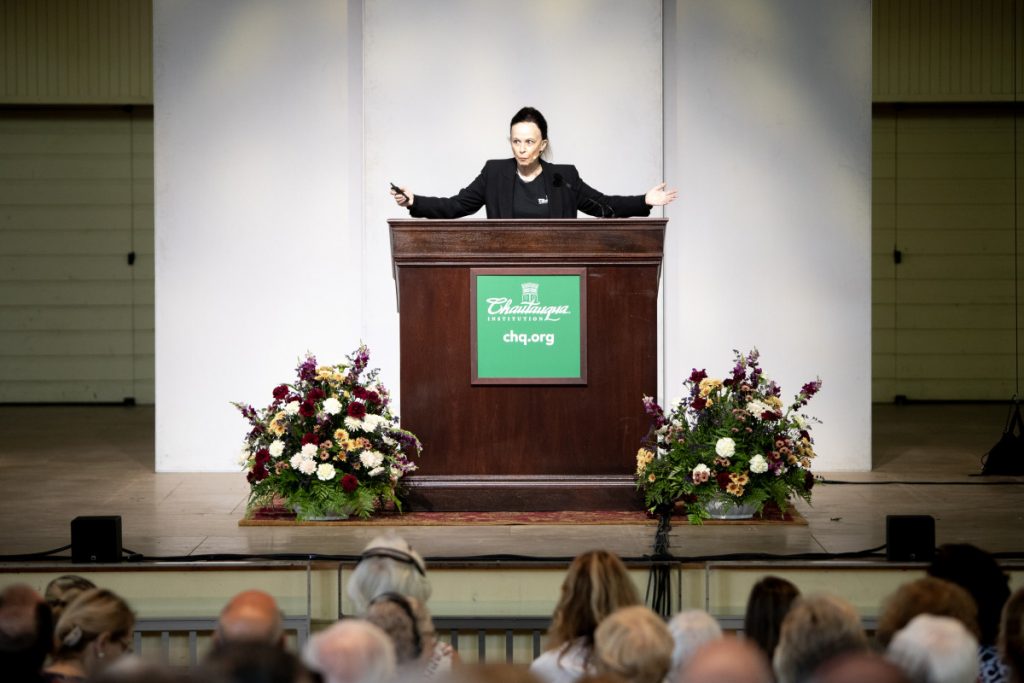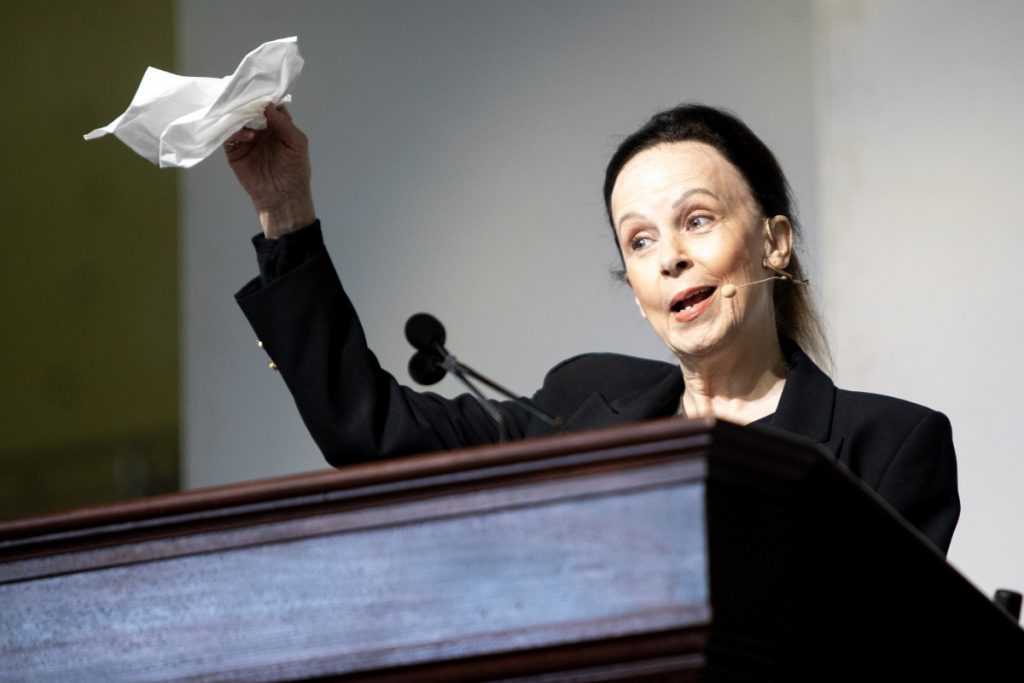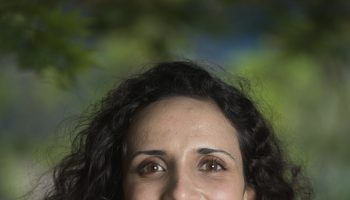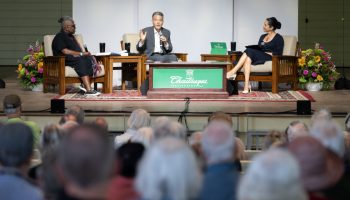
Susie Anderson
Staff Writer
War correspondent Robin Wright has traveled the world and visited Chautauqua numerous times — her grandfather, in fact, was one of the early members of the Chautauqua Movement.
“After traveling in over 150 countries, having done an expedition to the North Pole last summer and Antarctica six years ago, I know this world,” Wright said. “Chautauqua has the smartest audience in the world.”
At 10:45 am on Wednesday, Wright — New Yorker columnist and distinguished fellow at the Woodrow Wilson International Center for Scholars — returned to the Amphitheater stage for the Week Eight Chautauqua Lecture Series and the theme of “The Middle East: The Gulf States’ Emerging Influence.”
Wright presented a series of photographs capturing moments from her 52-year-long career as an international correspondent to ground Chautauquans in the humans behind the conflict and analyze the massive economic, political and cultural transformations in the Gulf States in the past half-century.
Wright opened with a photograph from Oct. 6, 1973, capturing Egyptians crossing the Suez Canal into Israel at the dawn of the Yom Kippur War. Upon landing in Beirut on the way to Iran, a woman in the airport told Wright of the unfolding events that would mark the beginning of the latest — at the time — war in the Middle East.
“I thought ‘Oh, expletive, I have never covered a war before,’ ” Wright said, self-censoring her recollection. That moment was the beginning of an extensive career covering conflict in the Middle East and beyond.
“For better or worse, I have covered every war, revolution and uprising in the region and much of the rest of the world in the intervening 52 years,” Wright said.
Wright takes to heart her law professor father’s advice to interpret conflicts by standing on the top of the world and looking down. Another source of advice emerges from a Zambian leader as he watched the Soviets invade Afghanistan.
“ ‘The tragedy,’ he said, ‘is that we don’t have the education to understand what we are seeing.’ In many ways, that is what Chautauqua is all about,” Wright said.
Contextualizing her experience, Wright presented photographs of herself — one was from Syria during the COVID-19 pandemic, which she described as a “particularly bad hair day.” One photograph was from the Iranian Revolution at the old Sheraton Hotel, of Wright standing alongside a female colleague, the wall behind them reading “Down with the USA.” Another depicted Wright bumping into Iran’s ambassador to the Vatican in the streets of Rome. Turning back to Chautauqua, Wright shared a memory of a more recent moment.
“Last night, I had dinner with very interesting people,” Wright said, “including an optimist.”
The conversation inspired Wright to comb through her personal photographs into the “wee hours of the morning” to “find something optimistic.”
The result was a series of photographs of smiling faces, young and old, from across the Gulf States. At protests during the Tahrir Square Uprising in Egypt in 2011, two young men look at the camera, each with a patch on one of their eyes. Despite Egyptian forces shooting BB guns at their faces in hopes of blinding them, the protesters were undeterred. Another photograph was of a young woman in Tripoli, Libya, a month after U.S. Ambassador J. Christopher Stevens was killed in Benghazi.
“I asked about how she felt about the future of her country,” Wright said, “and she pulled out the flag of her country that she kept with her.”
From young girls in Tehran showing Wright the plant they had grown, to two dusters in charge of cleaning the Ayatollah Khomeini’s tomb, Wright found humanity wherever she went.
“You find that there is a human-ness among people, that we forget about when we discuss conflict zones in the world,” Wright said.

Wright highlighted the relative youth of the Gulf States with a list of when each country was established, and the dates of when oil was discovered in each country, as well.
“With the exception of Iran, which dates back to the second millennium BC, the rest of them (were created) in the last century. Five of them in my lifetime,” Wright said. “These are very young states through which we have huge expectations.”
Across the Gulf States, each nation bears a wealth of diversity in religion, ethnicity and opinions.
“I always say for every five Iranians, there are six opinions,” said Wright.
With that diversity emerges the impact of colonialism, as Wright presented a series of stamps from Kuwait, Qatar and Bahrain, each depicting Queen Elizabeth II of England.
“Independence, development and having control of your own life is a new phenomenon in the Gulf,” Wright said.
In the case of Saudi Arabia, the forcible consolidation of ethnically diverse tribes across the state under Ibn Saud created a single state with fierce divisions. In Iran, religious diversity persists in the structure of its parliament, with seats for Christian and Jewish representatives.
“The largest Jewish community outside Israel in the Middle East is still in Iran — greatly diminished — but estimated to still be 25,000 strong,” Wright said.
In the past 50 years, developments in technology have swept the region. Wright described the 1980 telephone books of Saudi Arabia, filled only with the names of princes. Under each household name was a list of individual landlines in their home. Among them, Wright said, were “garage, bedroom, bathroom, guestroom, guestroom, guestroom, guestroom and second garage.”
“It was an amazing story about fast modernization with oil wealth, and how quickly Saudi Arabia was adapting,” she said.
Now, there are 1.5 phones for every person in Saudi Arabia. “And that includes newborns,” Wright said.
In another example of rapid modernization, Wright highlighted how — after a laborious entrance into Kurdistan through several flights, taxi trips and a trek through a smugglers’ route — she found her friend Barham Salih, then prime minister of the region, watching American election results on Fox News. Amid all of the rawness of the region, “he had access to the outside world in the single most sanctioned part of the globe.”
A central turning point in the Middle East, Wright highlighted, was the 1979 Iranian Revolution.
“Iranians — one of the most literate and historical people in the region — wanted something different,” Wright said. “There were many types of movements involved in the revolution, but the one banner they could rally under was the one common denominator — Islam.”
Beyond geography and politics, the revolution mobilized the Islamic minority Shiites toward activism in a way that never happened before, Wright said.
Wright also examined how her more recent interviews with ISIS members presented a trend of misinformation. In one conversation, Wright stumped an ISIS member on who prophesied the creation of an Islamic state.
“This is a guy who is in charge of educating other ISIS fighters and sending 12-, 13-, 14-year-olds off with suicide bombs to kill,” Wright said. “… The kind of people we think of sometimes are ill-informed, almost ignorant even about their faith.”
From an American working for ISIS in Syria to a Turk with a prosthetic leg from American bombings, Wright noticed a shared experience.
“The vast array of people who were attracted to ISIS because they believed there was nothing else out there for them,” Wright said.
Shifting to the rise of oil wealth, Wright displayed the prowess of the product as a weapon and source of immense wealth. In a bar graph presenting the largest oil reserves worldwide, five of the 12 countries were in the Gulf.
Throughout Wright’s lifetime, the Gulf States have experienced a complete transformation in education, as well.
“In 1972, 60% of Saudis were illiterate. Now, in 2025, only 4% of Saudis are illiterate,” she said. “In comparison, 21% of Americans are illiterate.”
While over 60% of students currently enrolled in universities in Saudi Arabia and Iran are women, the future of the Gulf States’ youth remains uncertain. As the youth of the Gulf States become increasingly connected with the wider world and recognize their lack of rights, Wright’s greatest worry emerges in the uncertain future for the people of the region.
“In contrast to the optimism,” Wright said, “without something else to lead them, we have not seen the end of extremism.”




